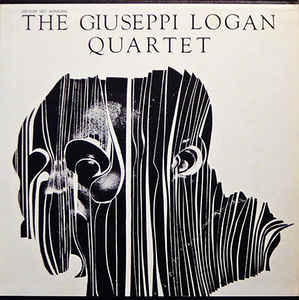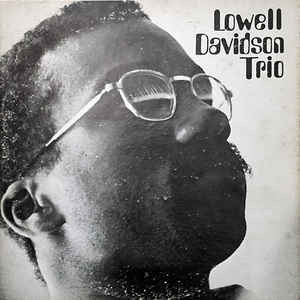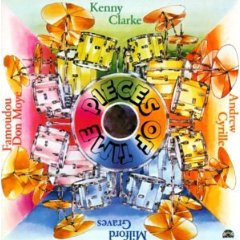
Albert Ayler was an American avant-garde jazz saxophonist, singer and composer.

James Marcellus Arthur "Sunny" Murray was an American musician, and was one of the pioneers of the free jazz style of drumming.

Milford Graves was an American jazz drummer, percussionist, Professor Emeritus of Music, researcher/inventor, visual artist/sculptor, gardener/herbalist, and martial artist. Graves was noteworthy for his early avant-garde contributions in the 1960s with Paul Bley, Albert Ayler, and the New York Art Quartet, and is considered to be a free jazz pioneer, liberating percussion from its timekeeping role. The composer and saxophonist John Zorn referred to Graves as "basically a 20th-century shaman."
The New York Art Quartet was a free jazz ensemble, originally made up of saxophonist John Tchicai, trombonist Roswell Rudd, drummer Milford Graves and bassist Lewis Worrell, that came into existence in 1964 in New York City. Worrell was later replaced by various other bassists, including Reggie Workman, Finn Von Eyben, Harold Dodson, Eddie Gómez, Steve Swallow, and Buell Neidlinger. All About Jazz reviewer Clifford Allen wrote that the group "cut some of the most powerful music in the free jazz underground".
Lowell Davidson was a jazz pianist and biochemist from Boston, Massachusetts. He was known for his "sensible and free flowing approach to unconventional linear improvisation", but appeared on only a handful of commercially-available recordings. Davidson also played bass, percussion, organ, electronic keyboards, and reed instruments.

Spiritual Unity is a studio album by American free jazz saxophonist Albert Ayler. It was recorded on July 10, 1964 in New York City, and features bassist Gary Peacock and drummer Sunny Murray. It was the first album recorded for Bernard Stollman's ESP-Disk label, and it brought Ayler to international attention as it was so "shockingly different". At the same time, it transformed ESP-DISK into "a major source for avant-garde jazz". A 5-star review in AllMusic called it a "landmark recording that's essential to any basic understanding of free jazz", "the album that pushed Albert Ayler to the forefront of jazz's avant-garde... really the first available document of Ayler's music that matched him with a group of truly sympathetic musicians", and stated that "the results are a magnificently pure distillation of his aesthetic."

New York Eye and Ear Control is an album of group improvisations recorded in July 1964 by an augmented version of Albert Ayler's group to provide the soundtrack for Michael Snow's film of the same name.
The Revolutionary Ensemble was a free jazz trio consisting of violinist Leroy Jenkins (1932–2007), bassist Sirone and percussionist/pianist Jerome Cooper (1946–2015). The group was active from 1970–1977, and reunited briefly in 2004. Musician George E. Lewis described the trio as "one of the signal groups of the period." Writer John Fordham stated that the group "was remarkable for its concentration on texture, tone colour and the then unclaimed territory between jazz and contemporary classical music." A DownBeat reviewer, writing in 1972, described them as "a unique, utterly contemporary unit of extraordinarily talented players who possess a world understanding of what 'organized sound' is all about."
Roger "Montego Joe" Sanders was an American jazz percussionist and drummer.

Charles Tyler Ensemble is the debut album by American jazz saxophonist Charles Tyler, which was recorded in 1966 in New York City and released on ESP-Disk.

Bells is a live album by American free jazz saxophonist Albert Ayler recorded at The Town Hall in New York City in 1965 and first released as a single sided LP on the ESP-Disk label. The album was released in many variations including clear and coloured vinyl and with a variety of colored covers and most recently on CD combined with Prophecy.

Prophecy is a live album by American free jazz saxophonist Albert Ayler recorded in New York City on June 14, 1964 and first released in 1975 on the ESP-Disk label.

The Giuseppi Logan Quartet is an album by American jazz saxophonist Giuseppi Logan, recorded at Bell Sound Studios in 1964 and released in 1965 on the ESP-Disk label. His first recording as leader, it features Logan on alto saxophone, tenor saxophone, Pakistani oboe, bass clarinet, and flute along with pianist Don Pullen, bassist Eddie Gómez, and drummer Milford Graves. Logan had moved to New York City in September 1964, and the recording took place shortly after the October Revolution in Jazz, at which Logan performed, and during which he met ESP-Disk founder Bernard Stollman. According to Logan, the musicians had not played together prior to the recording session.

Lowell Davidson Trio is the debut album by American jazz pianist Lowell Davidson, and the only commercially available recording issued during his lifetime. It was recorded in 1965, and was released on the ESP-Disk label. The album, which contains five original compositions, features Davidson on piano, along with Gary Peacock on bass and Milford Graves on drums.

New York Art Quartet is the debut album by the group of the same name. It was recorded on November 26, 1964, at Bell Sound Studios in New York City, and was released in 1965 by ESP-Disk as the fourth item in their catalog, following Albert Ayler's Spiritual Unity and Pharoah Sanders's Pharoah's First. It features John Tchicai on alto saxophone, Roswell Rudd on trombone, Lewis Worrell on bass, and Milford Graves on percussion. In addition, LeRoi Jones recites his controversial poem "Black Dada Nihilismus" on one track.

More is the second album by American jazz saxophonist Giuseppi Logan, recorded in May 1965 and released in 1966 by the ESP-Disk label. The album features Logan on alto saxophone, bass clarinet, flute, and piano along with pianist Don Pullen, bassists Eddie Gómez and Reggie Johnson, and drummer Milford Graves.

Pieces of Time is an album by jazz drummers Kenny Clarke, Andrew Cyrille, Milford Graves, and Famoudou Don Moye. It was recorded in September 1983, and was released by the Soul Note label in 1984. The album, the catalyst for which was Cyrille, presents compositions by all four musicians, along with four two-minute "personal statements." Liner notes were provided by Max Roach, who wrote: "This idea of four percussionists, using sounds as their premise in creating a work as profound as Pieces of Time, is pure artistic design."

Space/Time – Redemption is an album by drummer Milford Graves and bassist Bill Laswell. It was recorded in September and October 2013, and was released by TUM Records in 2014. The duo also recorded a second album, titled The Stone, in 2014.

Skillfulness is an album by multi-instrumentalist Alan Silva. It was recorded in November 1968 in New York City, and was released in 1969 by ESP-Disk. On the album, Silva is joined by flutist Becky Friend, pianist Dave Burrell, pianist and organist Mike Ephron, vibraphonist Karl Berger, and percussionists Lawrence Cooke, Barry Altschul, and Mario Pavone. The recording was made shortly before Silva moved to Europe.

The Will Come, Is Now is an album by bassist Ronnie Boykins, his sole release as a leader. It was recorded during February 1974, and was released on LP in 1975 by ESP-Disk. On the album, Boykins is joined by multi-instrumentalists Joe Ferguson and Jimmy Vass, saxophonist Monty Waters, trombonist Daoud Haroom, and percussionists Art Lewis and George Avaloz. Saxophonist Marzette Watts was the recording engineer.
















